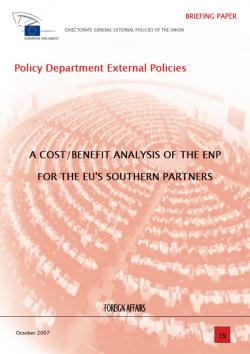A Cost/Benefit Analysis of the ENP for the EU's Southern Partners

The briefing paper seeks to provide an overview of the political, economic and social costs and benefits for the neighbouring countries in adapting their policies in the areas suggested by the ENP as well as to highlight the main constraints and factors favourable to pursuit of ENP objectives in such societies. In a representative selection of case studies involving both Maghreb and Mashreq countries, the study focuses on Morocco, Jordan and Egypt. Its recommendations include different kinds of incentives to be offered to the Southern neighbours, more flexible rules for the European Neighbourhood and Partnership Instrument, and better information of both the elite and the popular level about the ENP. The authors further call for improving the image of the EU and the ENP in these countries, notably through a relaxation of visa regimes, progress in trade liberalisation for agricultural products, as well as through a more effective EU role in crisis management in the area - namely with regard to the Israel-Palestine conflict.
Briefing paper carried out by the Istituto Affari Internazionali (IAI) within the framework agreement between the Trans-European Policy Studies Association (TEPSA) and the European Parliament. Published also in Graham Avery and Yvonne Nasshoven (eds.), The European Neighbourhood Policy: Challenges and Prospects, Brussels, Trans European Policy Studies Association (TEPSA), 2008, p. 59-78. Subsequent version: "The ENP's Potential for Reform in the Southern Mediterranean: A Cost/Benefit Analysis", in Michele Comelli, Atila Eralp, Çigdem Üstün (eds.), The European Neighbourhood Policy and the Southern Mediterranean, Ankara, Middle East Technical University Press, 2009, p. 53-77.
-
Details
Brussels, European Parliament, October 2007, 17 p. (European Parliament Policy Department External Policies Briefing Paper)
1. Introduction
2. Political costs and benefits, vested interests and reform potential
3. Economic costs and benefits, vested interests and reform potential
4. Social costs and benefits, vested interests and reform potential
5. Overall assessment of costs-benefits
6. Conditionality and potential suggestions for other incentives
Bibliography
Topic
Tag
Related content
-
Publication15/08/2015
The European Neighbourhood Policy and the Southern Mediterranean
leggi tutto -
Ricerca13/10/2014
The European Neighgourhood Policy
leggi tutto


